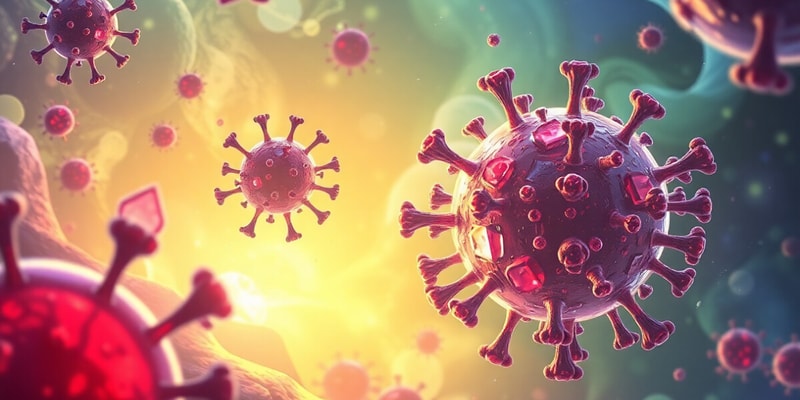Podcast Beta
Questions and Answers
What is the primary role of antibodies in the immune system?
Which phase of the immune response involves the formation of memory cells?
What characterizes innate immunity compared to adaptive immunity?
Which type of vaccine employs a weakened form of the pathogen?
Signup and view all the answers
Which cells are primarily involved in fighting intracellular pathogens?
Signup and view all the answers
Immunocompromised states can result from various conditions. Which of the following is NOT an immunocompromised condition?
Signup and view all the answers
What is the main purpose of vaccination?
Signup and view all the answers
Which statement correctly describes the role of Helper T cells in the immune response?
Signup and view all the answers
Study Notes
Immunity Overview
- Immunity: The body’s ability to resist or eliminate pathogens and foreign substances.
-
Types of Immunity:
-
Innate Immunity:
- First line of defense (nonspecific).
- Includes physical barriers (skin, mucous membranes) and immune cells (neutrophils, macrophages).
-
Adaptive Immunity:
- Specific response to pathogens.
- Involves lymphocytes (T cells and B cells).
-
Innate Immunity:
Key Concepts in Immunity
- Antigens: Substances that trigger an immune response.
- Antibodies: Proteins produced by B cells that bind to specific antigens.
-
Cell-Mediated Immunity:
- Mediated by T cells.
- Important in fighting intracellular pathogens (e.g., viruses).
-
Humoral Immunity:
- Mediated by B cells and antibodies.
- Effective against extracellular pathogens.
Immune Response Phases
- Recognition: Detection of antigens by immune cells.
- Activation: Proliferation of T and B cells.
- Response: Elimination of the pathogen.
- Memory: Formation of memory cells for quicker response to future infections.
Immune System Cells
- B Cells: Produce antibodies, responsible for humoral immunity.
-
T Cells:
- Helper T Cells (CD4): Assist other immune cells.
- Cytotoxic T Cells (CD8): Kill infected or cancerous cells.
- Natural Killer Cells: Fight against tumors and virus-infected cells.
- Dendritic Cells: Antigen-presenting cells that activate T cells.
Vaccination
- Purpose: To stimulate the immune system to develop memory against specific pathogens.
-
Types:
- Live Attenuated: Weakened form of the pathogen.
- Inactivated/Killed: Pathogens killed or inactivated.
- Subunit/Combo: Contains parts of the pathogen.
- mRNA Vaccines: Use genetic material to instruct cells to produce a pathogen protein.
Immunocompromised States
- Conditions that decrease immune function:
- HIV/AIDS: Attacks CD4+ T cells.
- Chemotherapy: Targets rapidly dividing cells, including immune cells.
- Autoimmune diseases: Immune system attacks the body's own cells.
NCLEX Considerations
-
Assessment:
- Look for signs of infection or immune dysfunction (fever, fatigue, repeated infections).
-
Patient Education:
- Importance of vaccination, hygiene, and nutrition for maintaining a healthy immune system.
-
Medications:
- Corticosteroids can suppress immune responses; monitor for signs of infection.
-
Interventions:
- Implement infection control practices.
- Educate on recognizing warning signs of infections.
Key Terms
- Immunization: Process of making a person immune to an infection.
- Autoimmunity: Condition where the immune system attacks the body’s own tissues.
- Hypersensitivity: Exaggerated immune response to an antigen.
Immunity Overview
- The body's ability to defend against pathogens and foreign substances.
- Innate Immunity: First line of defense, non-specific. Includes physical barriers like skin and mucous membranes, and immune cells like neutrophils and macrophages.
- Adaptive Immunity: Specific response to pathogens, involves lymphocytes like T cells and B cells.
Key Concepts in Immunity
- Antigens: Substances that trigger an immune response.
- Antibodies: Proteins produced by B cells that bind to specific antigens.
- Cell-Mediated Immunity: Mediated by T cells, important for fighting intracellular pathogens (viruses).
- Humoral Immunity: Mediated by B cells and antibodies, effective against extracellular pathogens.
Immune Response Phases
- Recognition: Detection of antigens by immune cells.
- Activation: Proliferation of T and B cells.
- Response: Elimination of the pathogen.
- Memory: Formation of memory cells for quicker responses to future infections.
Immune System Cells
- B Cells: Produce antibodies, responsible for humoral immunity.
-
T Cells:
- Helper T Cells (CD4): Assist other immune cells.
- Cytotoxic T Cells (CD8): Kill infected or cancerous cells.
- Natural Killer Cells: Fight against tumors and virally infected cells.
- Dendritic Cells: Antigen-presenting cells that activate T cells.
Vaccination
- Purpose: To stimulate the immune system to develop memory against specific pathogens.
-
Types:
- Live Attenuated: Weakened form of the pathogen.
- Inactivated/Killed: Pathogens killed or inactivated.
- Subunit/Combo: Contains parts of the pathogen.
- mRNA Vaccines: Use genetic material to instruct cells to produce a pathogen protein.
Immunocompromised States
- Conditions that decrease immune function:
- HIV/AIDS: Attacks CD4+ T cells.
- Chemotherapy: Targets rapidly dividing cells, including immune cells.
- Autoimmune diseases: Immune system attacks the body's own cells.
NCLEX Considerations
- Assessment: Look for signs of infection or immune dysfunction (fever, fatigue, repeated infections).
- Patient Education: Importance of vaccination, hygiene, and nutrition for maintaining a healthy immune system.
- Medications: Corticosteroids can suppress immune responses; monitor for signs of infection.
- Interventions: Implement infection control practices and educate on recognizing warning signs of infections.
Key Terms
- Immunization: Process of making a person immune to an infection.
- Autoimmunity: Condition where the immune system attacks the body’s own tissues.
- Hypersensitivity: Exaggerated immune response to an antigen.
Studying That Suits You
Use AI to generate personalized quizzes and flashcards to suit your learning preferences.
Description
Test your knowledge on the basics of immunity, including the types of immunity, key concepts like antigens and antibodies, and the phases of immune response. This quiz will help reinforce your understanding of innate and adaptive immunity.




